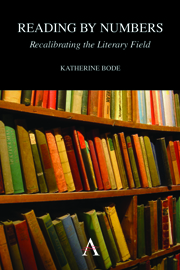Book contents
- Frontmatter
- Contents
- Acknowledgements
- List of Tables and Figures
- Introduction A New History of the Australian Novel
- Chapter 1 Literary Studies in the Digital Age
- Chapter 2 Beyond the Book: Publishing in the Nineteenth Century
- Chapter 3 Nostalgia and the Novel: Looking Back, Looking Forward
- Chapter 4 Recovering Gender: Rethinking the Nineteenth Century
- Chapter 5 The ‘Rise’ of the Woman Novelist: Popular and Literary Trends
- Conclusion Literary Studies in the Digital Future
- Notes
- Bibliography
- Index
Chapter 3 - Nostalgia and the Novel: Looking Back, Looking Forward
- Frontmatter
- Contents
- Acknowledgements
- List of Tables and Figures
- Introduction A New History of the Australian Novel
- Chapter 1 Literary Studies in the Digital Age
- Chapter 2 Beyond the Book: Publishing in the Nineteenth Century
- Chapter 3 Nostalgia and the Novel: Looking Back, Looking Forward
- Chapter 4 Recovering Gender: Rethinking the Nineteenth Century
- Chapter 5 The ‘Rise’ of the Woman Novelist: Popular and Literary Trends
- Conclusion Literary Studies in the Digital Future
- Notes
- Bibliography
- Index
Summary
The golden age of Australian publishing and the promotion of Australian literature, primed by the 1972 Whitlam victory and kept going through the 1980s by the financial largesse associated with the celebration of the 1988 Bicentenary of Australia, is well and truly over.
The previous chapter ended with the 1890s, described by Martyn Lyons as ‘perhaps the most mythologised decade in Australian cultural history’. He identifies the ‘generation of the 1950s [as] largely responsible for idealising the 1890s, as intellectuals searched nostalgically for roots that might sustain a post-war resurgence of Australian literary culture’. This generation, he argues, imagined the 1890s
as a creative moment when a specifically Australian literary nationalism took shape, based on a democratic and fiercely independent spirit located in a mythologised version of life in the bush. The bushman was a folk-hero…questioning dependence on Britain and challenging pretensions of the powerful.
This understanding of the 1890s has been widely recognised and critiqued – or as Lyons puts it, ‘thoroughly contested’ and ‘severely punctured’ – by the generation that followed that of the 1950s, commonly referred to as ‘baby boomers’. Indeed, one could argue that the major movements in literary studies spearheaded by this generation since the 1970s – Marxism, feminism and post-colonialism – have been articulated in the Australian context as a series of challenges precisely to this 1950s definition of ‘Australian literature’, and the literary nationalism underpinning it.
- Type
- Chapter
- Information
- Reading by NumbersRecalibrating the Literary Field, pp. 57 - 104Publisher: Anthem PressPrint publication year: 2012



